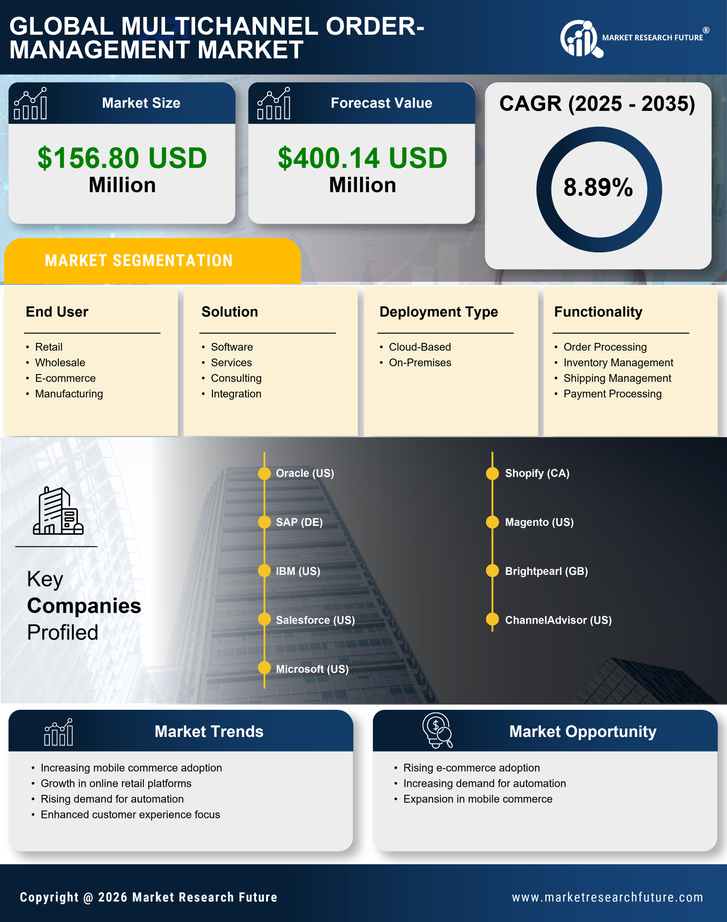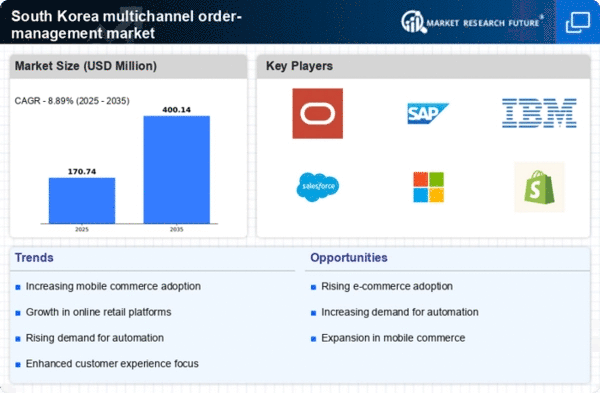Rising E-commerce Adoption
The rapid growth of e-commerce in South Korea is a primary driver for the multichannel order-management market. As more consumers turn to online shopping, businesses are compelled to adopt sophisticated order management systems to handle increased transaction volumes. In 2025, e-commerce sales in South Korea are projected to reach approximately $100 billion, indicating a robust demand for efficient order processing solutions. This trend necessitates the integration of various sales channels, including online marketplaces and physical stores, to streamline operations. Consequently, companies are investing in multichannel order-management systems to enhance their operational efficiency and customer satisfaction. The multichannel order-management market is thus positioned to benefit significantly from this e-commerce boom, as businesses seek to optimize their order fulfillment processes and meet consumer expectations.
Consumer Demand for Personalization
The increasing consumer demand for personalized shopping experiences is driving the multichannel order-management market. South Korean consumers are increasingly expecting tailored services, which compels retailers to adopt systems that can manage diverse customer preferences across multiple channels. In 2025, it is estimated that 70% of consumers in South Korea will prefer brands that offer personalized experiences, prompting businesses to invest in multichannel order-management solutions that can analyze customer data and provide customized offerings. This shift towards personalization requires robust order management systems capable of integrating customer insights and preferences into the fulfillment process. As a result, the multichannel order-management market is likely to see substantial growth as companies strive to meet these evolving consumer expectations.
Regulatory Compliance and Standards
The evolving regulatory landscape in South Korea is a critical driver for the multichannel order-management market. Businesses are increasingly required to comply with various regulations related to data protection, consumer rights, and environmental standards. In 2025, compliance costs are projected to rise by 15% for companies operating in the retail sector, necessitating the adoption of efficient order management systems that can ensure adherence to these regulations. Multichannel order-management solutions are being designed to incorporate compliance features, enabling businesses to manage their operations within legal frameworks while minimizing risks. This focus on regulatory compliance not only protects businesses from potential penalties but also enhances their reputation among consumers, thereby driving demand for advanced order management systems.
Technological Advancements in Logistics
Technological innovations in logistics and supply chain management are significantly influencing the multichannel order-management market. The adoption of automation, artificial intelligence, and data analytics is transforming how businesses manage their inventory and fulfill orders. In South Korea, logistics technology investments are expected to exceed $5 billion by 2026, reflecting a growing emphasis on efficiency and accuracy. These advancements enable companies to track orders in real-time, optimize delivery routes, and reduce operational costs. As a result, businesses are increasingly turning to multichannel order-management solutions that can seamlessly integrate with these technologies, ensuring a more agile and responsive supply chain. This trend not only enhances customer satisfaction but also positions companies to compete effectively in a dynamic market environment.
Expansion of Omnichannel Retail Strategies
The expansion of omnichannel retail strategies is significantly impacting the multichannel order-management market. South Korean retailers are increasingly adopting omnichannel approaches to provide a seamless shopping experience across various platforms, including online, mobile, and in-store. This shift is driven by consumer preferences for flexibility and convenience, with studies indicating that 60% of South Korean shoppers engage with multiple channels before making a purchase. As a result, businesses are investing in multichannel order-management systems that can effectively coordinate inventory, orders, and customer interactions across all channels. This trend not only enhances operational efficiency but also improves customer satisfaction, positioning the multichannel order-management market for continued growth as retailers strive to meet the demands of an increasingly connected consumer base.
















